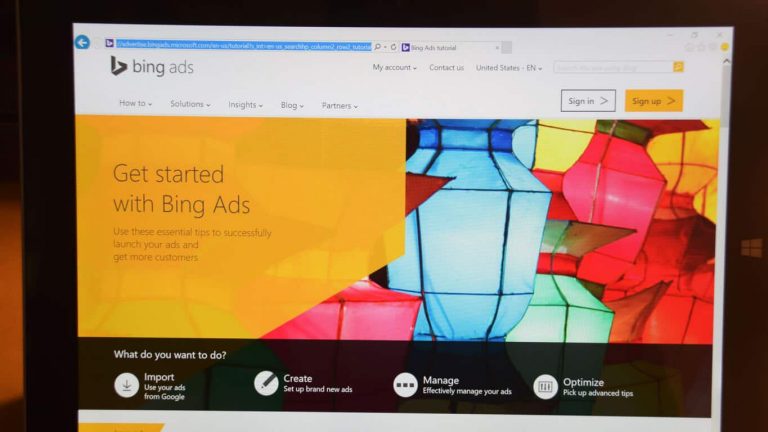Last week, Microsoft held their Bing Ads Next briefing, bringing 60 advertisers to Redmond for the event. It was an opportunity for Rik van der Kooi, Microsoft’s Corporate Vice President of Advertiser and Publisher Solutions, and his team to speak to ad executives about Microsoft’s strategy for Bing and instill confidence for the growing search engine.
As we reported earlier this fall, Bing reached a significant milestone of surpassing the 20% market share threshold in the US search market. The number climbs up to over one third market share if you include searches made with Bing through syndication arrangements, like Microsoft’s deal with Yahoo. We also recently reported that according to Microsoft’s most recent financial filing with the SEC, Bing is now profitable and contributed more than $1 billion in revenue.
Microsoft has also restructured their ad business this year, selling their display ad sales unit to AOL and AppNexus. This deal brings Bing to new partners, such as Bing powering search across AOL’s portfolio of websites, and allows Microsoft to focus on the development of the search engine instead of this one aspect of sales.
And as Ginny Marvin reports for Search Engine Land, Rik van der Kooi explained more at the Bings Ad Next briefing about how Microsoft plans to continue the grow and differentiate Bing. Van der Kooi laid out the company’s three-pronged approach to growing the search engine’s share of the mobile search market.
The first prong includes Windows Phone, which while the struggling mobile operating system has seen multiple drops in share of overall new shipments, still has a number of markets, specifically certain European countries, “where Windows Phone continues to hold onto 20 percent share.” Bing is the default search engine on these phones. Microsoft will also continue to look for partnerships to increase its mobile search market share like their partnership with Apple to use Bing as the default search engine for Siri. Finally, Bing will be integrated into Microsoft’s mobile apps on iOS and Android phones, such as bringing Bing into Office apps.
Paul Apodaca, Microsoft’s Principal Project Manager for Bing, also spoke about the Bing team’s agile approach to engineering and how this has positively impacted the business. Ginny Marvin reports that “The pace of feature tests and releases has picked up significantly in the past year.” This has resulted in new feature for the search engine such as “automated rules, multi-account bulk spreadsheet management, the ability to include new and refurbished items in Shopping campaigns and a flurry of ad extensions.” The engineering team also achieved a milestone of being able to announce that Bing Ads Editor for Mac is on the way. We recently reported on another release, Bing Image Stream:
Ryan Gavin, Microsoft General Manager for Search, Cloud and Content, then spoke to how Bing offers a differentiated customer experience. One way the search engine achieves this is through Bing Predicts. By offering focused content on what people are passionate about, Microsoft is driving engagement for commercial opportunities. Gavin noted that they often see search volumes in areas like “football, Nascar, awards shows, and elections,” surpassing Google’s because of Bing Predict’s in-depth focus on these topics.
Microsoft is also using Cortana to differentiate its search engine and continue Bing’s growth. They plan to do this by creating a personal speech recognition tool and digital assistant experience that people will want take with them to any device. Their hope is that Cortana users will take the experience with them from the search bar in Windows 10 to their mobile devices, including the upcoming Cortana apps for Android and iOS.
[pullquote align=”left” cite=”” link=”” color=”” class=”” size=””]Microsoft (is) prepared to introduce Bing into the Skype platform to benefit users[/pullquote]
Lastly, since the Bing Ads Next briefing, Rik van der Kooi has spoken with the press about their plans for growing Bing. In a recent article in the Independent, Rik van der Kooi said they are even imagining bringing Bing not just to Office apps, but to Skype as well:
He said that Microsoft was prepared to introduce Bing into the Skype platform to benefit users. “In the future we are thinking about not artificially pushing it in but maybe putting it in where it’s of use to the user.
“I could imagine a scenario where if you were either talking with somebody via Skype or chatting via Skype, that providing a search experience inside of Skype is a very valuable experience. And if it’s valuable to the user then we would consider it.”
While the growing pains of Bing’s rocky start may be over, it is clear Bing’s plans for growth are not. And Microsoft is starting to reveal more of their envisioning of a bold and diverse future for their search engine powering app and web based searches in new ways.



